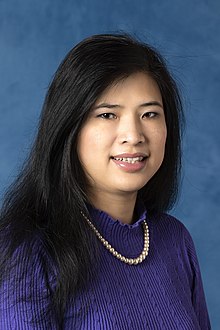Nguyen Thanh | |
|---|---|
 | |
| Born | Nguyễn Thị Kim Thanh |
| Alma mater | Vietnam National University, Hanoi (BSc) University of Amsterdam (MSc) University of East London (PhD) |
| Awards | Rosalind Franklin Award (2019) Royal Society University Research Fellowship (2005) |
| Scientific career | |
| Fields | Nanoscience |
| Institutions | University of New Orleans University of Liverpool University College London |
| Thesis | Renal lipid changes in response to chemical insults (1998) |
| Website | www |
Nguyễn Thị Kim Thanh FRSC FInstP FRSB FIMMM is a professor of Nanomaterials at University College London.[1] She was awarded the 2019 Royal Society Rosalind Franklin Award for her research and efforts toward gender equality.[2]
Early life and education
Thanh grew up in Vietnam. She studied chemistry at the Vietnam National University, Hanoi, which she graduated in 1992.[3] She was selected for the Netherlands organisation for international cooperation in higher education (NUFFIC) scheme and moved to the University of Amsterdam to begin a Master's program in chemistry.[3] Thanh completed her master's degree in 1994, before being selected for a PhD program in biochemistry at the University of East London.[3][4][5] During her PhD she developed new techniques to study the renal toxicity of N-Phenylanthranilic acid.[5] To do this, she studied various types of lipids in rat kidneys and demonstrated that lipids are a viable non-invasive method to study renal papillary necrosis.[5]
Research and career
After her PhD, Thanh was a postdoctoral researcher at Aston University, where she worked on medicinal chemistry. She developed a technique that could be used to synthesise cell membrane permeable fluorescent versions of cyclic adenosine monophosphate (cAMP) and cyclic guanosine monophosphate (cGMP).[5] Thanh moved to the University of New Orleans in 2001, where she began to work with nanotechnology.[3] Here she developed nanoparticle sensors for biological assays. In particular, Thanh used gold nanoparticles combined with fluorescent sensors.[5] She moved to the University of Liverpool in 2003, where she worked in the Centre for Nanoscience.[3] Here she worked with glycosaminoglycan and tissue engineering.[5] She was awarded a Royal Society University Research Fellowship and appointed a lecturer in 2005.[3] She took part in the Royal Society parliamentary pairing scheme in 2007, and was paired with Andrew Miller, then Chair of the Science and Technology Select Committee.[6]
In 2009 Thanh joined University College London as an associate professor of nanotechnology, where she is based in the Davy Faraday Laboratory.[3][7] She studies nanomaterials and their applications in biomedicine, and has continued to investigate colloidal gold.[3][8] She is particularly interested in magnetic nanoparticles and how they can be used to treat cancer.[9]
Awards and honours
In 2010 she presented her work in nanoscience at the Royal Society Summer Exhibition.[10][11] The project was selected by the New Scientist as one of the highlights of the show.[12] Thanh is involved with the London Centre for Nanotechnology and was a co-founding member of the Global Young Academy.[6][13] She has presented at the World Economic Forum, the Vietnam Young Academy and the European Commission.[6] She was awarded the 2019 Rosalind Franklin Award from the Royal Society.[14]
She is a Fellow of the Institute of Physics (FInstP), the Royal Society of Chemistry (FRSC), the Royal Society of Biology (FRSB) and the Institute of Materials, Minerals and Mining (FIMMM).[5]
Selected publications
Her publications[2] include:
- Magnetic Nanoparticles: From Fabrication to Clinical Applications[3]
- Clinical Applications of Magnetic Nanoparticles: From Fabrication to Clinical Applications[15]
- Determination of Size and Concentration of Gold Nanoparticles from UV−Vis Spectra[16]
- Progress in applications of magnetic nanoparticles in biomedicine[17]
References
- ↑ Nguyen TK Thanh publications from Europe PubMed Central
- 1 2 Nguyen TK Thanh publications indexed by Google Scholar
- 1 2 3 4 5 6 7 8 9 Thanh, Nguyen TK (2012). Magnetic Nanoparticles: From Fabrication to Clinical Applications. CRC Press. ISBN 978-1439869338.
- ↑ Thanh, Nguyen Thi Kim (1998). Renal lipid changes in response to chemical insults. copac.jisc.ac.uk (PhD thesis). University of East London. OCLC 556918620. EThOS uk.bl.ethos.246194.
- 1 2 3 4 5 6 7 UCL (2018-04-25). "Professor Thanh Nguyen". UCL Department of Physics and Astronomy. Retrieved 2019-07-18.
- 1 2 3 "Nguyen TK Thanh". globalyoungacademy.net. Global Young Academy. Retrieved 2019-07-18.
- ↑ "Thanh Lab". ucl.ac.uk. Retrieved 2019-07-18.
- ↑ UCL Minds Lunch Hour Lectures (2019-01-21), Lunch Hour Lecture - Nanomaterials tackling the global health challenges - Professor Thanh, retrieved 2019-07-18
- ↑ Anon (2015-09-29), "Science stories - Small", youtube.com, Royal Society, retrieved 2019-07-18
- ↑ Thanh, N. T. K.; Pankhurst, Q. (2012-06-03). "Royal Society Summer Science Exhibition: Nanoscale Science a Giant Leap for Mankind". London, UK. 25 June 2010 - 04 July 2010. Retrieved 2019-07-18.
- ↑ "Nanoscale science: a giant leap for mankind | Royal Society". royalsociety.org. Retrieved 2019-07-18.
- ↑ "Nanoscale science: a giant leap for mankind". newscientist.com. Retrieved 2019-07-18.
- ↑ "LCN - Nguyen TK Thanh". london-nano.com. London Centre for Nanotechnology. Retrieved 2019-07-18.
- ↑ "Royal Society Rosalind Franklin Award and Lecture | Royal Society". royalsociety.org. Retrieved 2019-07-18.
- ↑ Clinical applications of magnetic nanoparticles : design to diagnosis manufacturing to medicine. Thanh, Nguyen T. K. (Thi Kim). Boca Raton. ISBN 9781315168258. OCLC 1023861572.
{{cite book}}: CS1 maint: others (link) - ↑ Haiss, Wolfgang; Thanh, Nguyen T. K.; Aveyard, Jenny; Fernig, David G. (2007). "Determination of Size and Concentration of Gold Nanoparticles from UV−Vis Spectra". Analytical Chemistry. 79 (11): 4215–4221. doi:10.1021/ac0702084. ISSN 0003-2700. PMID 17458937.
- ↑ Pankhurst, Q A; Thanh, N T K; Jones, S K; Dobson, J (2009). "Progress in applications of magnetic nanoparticles in biomedicine". Journal of Physics D: Applied Physics. 42 (22): 224001. Bibcode:2009JPhD...42v4001P. doi:10.1088/0022-3727/42/22/224001. ISSN 0022-3727. S2CID 31479655.